- Home
- Fyodor Dostoyevsky
The Double Page 6
The Double Read online
Page 6
Chapter VI
At eight o'clock next morning Mr. Golyadkin woke up in his bed. At once all the extraordinary incidents of the previous day and the wild, incredible night, with all its almost impossible adventures, presented themselves to his imagination and memory with terrifying vividness. Such intense, diabolical malice on the part of his enemies, and, above all, the final proof of that malice, froze Mr. Golyadkin's heart.
But at the same time it was all so strange, incomprehensible, wild, it seemed so impossible, that it was really hard to credit the whole business; Mr. Golyadkin was, indeed, ready to admit himself that it was all an incredible delusion, a passing aberration of the fancy, a darkening of the mind, if he had not fortunately known by bitter experience to what lengths spite will sometimes carry any one, what a pitch of ferocity an enemy may reach when he is bent on revenging his honour and prestige. Besides, Mr. Golyadkin's exhausted limbs, his heavy head, his aching back, and the malignant cold in his head bore vivid witness to the probability of his expedition of the previous night and upheld the reality of it, and to some extent of all that had happened during that expedition. And, indeed, Mr. Golyadkin had known long, long before that something was being got up among them, that there was some one else with them. But after all, thinking it over thoroughly, he made up his mind to keep quiet, to submit and not to protest for the time.
"They are simply plotting to frighten me, perhaps, and when they see that I don't mind, that I make no protest, but keep perfectly quiet and put up with it meekly, they'll give it up, they'll give it up of themselves, give it up of their own accord."
Such, then, were the thoughts in the mind of Mr. Golyadkin as, stretching in his bed, trying to rest his exhausted limbs, he waited for Petrushka to come into his room as usual . . . He waited for a full quarter of an hour. He heard the lazy scamp fiddling about with the samovar behind the screen, and yet he could not bring himself to call him. We may say more: Mr. Golyadkin was a little afraid of confronting Petrushka.
"Why, goodness knows," he thought, "goodness knows how that rascal looks at it all. He keeps on saying nothing, but he has his own ideas."
At last the door creaked and Petrushka came in with a tray in his hands. Mr. Golyadkin stole a timid glance at him, impatiently waiting to see what would happen, waiting to see whether he would not say something about a certain circumstance. But Petrushka said nothing; he was, on the contrary, more silent, more glum and ill-humoured than usual; he looked askance from under his brows at everything; altogether it was evident that he was very much put out about something; he did not even once glance at his master, which, by the way, rather piqued the latter. Setting all he had brought on the table, he turned and went out of the room without a word.
"He knows, he knows, he knows all about it, the scoundrel!" Mr. Golyadkin grumbled to himself as he took his tea. Yet out hero did not address a single question to his servant, though Petrushka came into his room several times afterwards on various errands. Mr. Golyadkin was in great trepidation of spirit. He dreaded going to the office. He had a strong presentiment that there he would find something that would not be "just so."
"You may be sure," he thought, "that as soon as you go you will light upon something! Isn't it better to endure in patience? Isn't it better to wait a bit now? Let them do what they like there; but I'd better stay here a bit today, recover my strength, get better, and think over the whole affair more thoroughly, then afterwards I could seize the right moment, fall upon them like snow from the sky, and get off scot free myself."
Reasoning like this, Mr. Golyadkin smoked pipe after pipe; time was flying. It was already nearly half-past nine.
"Why, it's half-past nine already," thought Mr. Golyadkin; "it's late for me to make my appearance. Besides, I'm ill, of course I'm ill, I'm certainly ill; who denies it? What's the matter with me? If they send to make inquiries, let the executive clerk come; and, indeed, what is the mater with me really? Mr back aches, I have a cough, and a cold in my head; and, in fact, it's out of the question for me to go out, utterly out of the question in such weather. I might be taken ill and, very likely, die; nowadays especially the death-rate is so high . . ."
With such reasoning Mr. Golyadkin succeeded at last in setting his conscience at rest, and defended himself against the reprimands he expected from Andrey Filippovitch for neglect of his duty. As a rule in such cases our hero was particularly fond of justifying himself in his own eyes with all sorts of irrefutable arguments, and so completely setting his conscience at rest. And so now, having completely soothed his conscience, he took up his pipe, filled it, and had no sooner settled down comfortably to smoke, when he jumped up quickly from the sofa, flung away the pipe, briskly washed, shaved, and brushed his hair, got into his uniform and so on, snatched up some papers, and flew to the office.
Mr. Golyadkin went into his department timidly, in quivering expectation of something unpleasant--an expectation which was none the less disagreeable for being vague and unconscious; he sat timidly down in his invariable place next the head clerk, Anton Antonovitch Syetotchkin. Without looking at anything or allowing his attention to be distracted, he plunged into the contents of the papers that lay before him. He made up his mind and vowed to himself to avoid, as far as possible, anything provocative, anything that might compromise him, such as indiscreet questions, jests, or unseemly allusions to any incidents of the previous evening; he made up his mind also to abstain from the usual interchange of civilities with his colleagues, such as inquiries after health and such like.
But evidently it was impossible, out of the question, to keep to this. Anxiety and uneasiness in regard to anything near him that was annoying always worried him far more than the annoyance itself. And that was why, in spite of his inward vows to refrain from entering into anything, whatever happened, and to keep aloof from everything, Mr. Golyadkin from time to time, on the sly, very, very quietly, raised his head and stealthily looked about him to right and to left, peeped at the countenances of his colleagues, and tried to gather whether there were not something new and particular in them referring to himself and with sinister motives concealed from him. He assumed that there must be a connection between all that had happened yesterday and all that surrounded him now. At last, in his misery, he began to long for something--goodness knows what--to happen to put an end to it--even some calamity--he did not care. At this point destiny caught Mr. Golyadkin: he had hardly felt this desire when his doubts were solved in the strange and most unexpected manner.
The door leading from the next room suddenly gave a soft and timid creak, as though to indicate that the person about to enter was a very unimportant one, and a figure, very familiar to Mr. Golyadkin, stood shyly before the very table at which our hero was seated. The latter did not raise his head--no, he only stole a glance at him, the tiniest glance; but he knew all, he understood all, to every detail. He grew hot with shame, and buried his devoted head in his papers with precisely the same object with which the ostrich, pursued by hunters, hides his head in the burning sand. The new arrival bowed to Andrey Filippovitch, and thereupon he heard a voice speaking in the regulation tone of condescending tone of politeness with which all persons in authority address their subordinates in public offices.
"Take a seat here." said Andrey Filippovitch, motioning the newcomer to Anton Antonovitch's table. "Here, opposite Mr. Golyadkin, and we'll soon give you something to do."
Andrey Filippovitch ended by making a rapid gesture that decorously admonished the newcomer of his duty, and then he immediately became engrossed in the study of the papers that lay in a heap before him.
Mr. Golyadkin lifted his eyes at last, and that he did not fall into a swoon was simply because he had foreseen it all from the first, that he had been forewarned from the first, guessing in his soul who the stranger was. Mr. Golyadkin's first movement was to look quickly about him, to see whether there were any whispering, any office joke being cracked on the subject, whether any one's face was agape with wonder, wheth
er, indeed, some one had not fallen under the table from terror. But to his intense astonishment there was no sign of anything of the sort. The behaviour of his colleagues and companions surprised him. It seemed contrary to the dictates of common sense. Mr. Golyadkin was positively scared at this extraordinary reticent. The fact spoke for itself; it was a strange, horrible, uncanny thing. It was enough to rouse any one.
All this, of course, only passed rapidly through Mr. Golyadkin's mind. He felt as though he were burning in a slow fire. And, indeed, there was enough to make him. The figure that was sitting opposite Mr. Golyadkin now was his terror, was his shame, was him nightmare of the evening before; in short, was Mr. Golyadkin himself, not the Mr. Golyadkin who was sitting now in his chair with his mouth wide open and his pen petrified in his hand, not the one who acred as assistant to his chief, not the one who liked to efface himself and slink away in the crowd, not the one whose deportment plainly said, "Don't touch me and I won't touch you," or, "Don't interfere with me, you see I'm not touching you"; no, this was another Mr. Golyadkin, quite different, yet at the same time, exactly like the first--the same height, the same figure, the same clothes, the same baldness; in fact, nothing, absolutely nothing, was lacking to complete the likeness, so that if one were to set them side by side, nobody, absolutely nobody, could have undertaken to distinguish which was the real Mr. Golyadkin and which was the new one, which was the original and which was the copy.
Our hero was--if the comparison can be made--in the position of a man upon whom some practical joker has stealthily, by way of jest, turned a burning glass.
"What does it mean? Is it a dream?" he wondered. "Is it reality or the continuation of what happened yesterday? And besides, by what right is this all being done? Who sanctioned such a clerk, who authorized this? Am I asleep, am I in a waking dream?"
Mr. Golyadkin tried pinching himself, even tried to screw up his courage to pinch some one else . . . No, it was not a dream and that was all about it. Mr. Golyadkin felt that the sweat was trickling down him in big drops; he felt that what was happening to him was something incredible, unheard of, and for that very reason was, to complete his misery, utterly unseemly, for Mr. Golyadkin realized and felt how disadvantageous it was to be the first example of such a burlesque adventure. He even began to doubt his own existence, and though he was prepared for anything and had been longing for his doubts to be settled in any way whatever, yet the actual reality was startling in its unexpectedness. His misery was poignant and overwhelming. At times he lost all power of thought and memory.
Coming to himself after such a moment, he noticed that he was mechanically and unconsciously moving the pen over the paper. Mistrustful of himself, he began going over what he had written--and could make nothing of it. At last the other Mr. Golyadkin, who had been sitting discreetly and decorously at the table, got up and disappeared through the door into the other room. Mr. Golyadkin looked around--everything was quiet; he heard nothing but the scratching of pens, the rustle of turning over pages, and conversation in the corners furthest from Andrey Filippovitch's seat. Mr. Golyadkin looked at Anton Antonovitch, and as, in all probability, our hero's countenance fully reflected his real condition and harmonized with the whole position, and was consequently, from one point of view, very remarkable, good-natured Anton Antonovitch, laying aside his pen, inquired after his health with marked sympathy.
"I'm very well, thank God, Anton Antonovitch," said Mr. Golyadkin, stammering. "I am perfectly well, Anton Antonovitch. I am all right now, Anton Antonovitch," he added uncertainly, not yet fully trusting Anton Antonovitch, whose name he had mentioned so often.
"I fancied you were not quite well: though that's not to be wondered at; no, indeed! Nowadays especially there's such a lot of illness going about. Do you know . . ."
"Yes, Anton Antonovitch, I know there is such a lot of illness . . . I did not mean that, Anton Antonovitch," Mr. Golyadkin went on, looking intently at Anton Antonovitch. "You see, Anton Antonovitch, I don't even know how you, that is, I mean to say, how to approach this matter, Anton Antonovitch. . . ."
"How so? I really . . . do you know . . . I must confess I don't quite understand; you must . . . you must explain, you know, in what way you are in difficulties," said Anton Antonovitch, beginning to be in difficulties himself, seeing that there were actually tears in Mr. Golyadkin's eyes.
"Really, Anton Antonovitch . . . I . . . here . . . there's a clerk here, Anton Antonovitch . . ."
"Well! I don't understand now."
"I mean to say, Anton Antonovitch, there's a new clerk here."
"Yes, there is; a namesake of yours."
"What?" cried Mr. Golyadkin.
"I say a namesake of yours; his name's Golyadkin too. Isn't he a brother of yours?"
"No, Anton Antonovitch, I . . ."
"H'm! you don't say so! Why, I thought he must be a relation of yours. Do you know, there's a sort of family likeness."
Mr. Golyadkin was petrified with astonishment, and for the moment he could not speak. To treat so lightly such a horrible, unheard-of thing, a thing undeniably rare and curious in its way, a thing which would have amazed even an unconcerned spectator, to talk of a family resemblance when he could see himself as in a looking-glass!
"Do you know, Yakov Petrovitch, what I advise you to do?" Anton Antonovitch went on. "Go and consult a doctor. Do you know, you look somehow quite unwell. You eyes look peculiar . . . you know, there's a peculiar expression in them."
"No, Anton Antonovitch, I feel, of course . . . that is, I keep wanting to ask about this clerk."
"Well?"
"That is, have not you noticed, Anton Antonovitch, something peculiar about him, something very marked?"
"That is . . . ?"
"That is, I mean, Anton Antonovitch, a striking likeness with somebody, for instance; with me, for instance? You spoke just now, you see, Anton Antonovitch, of a family likeness. You let slip the remark. . . . You know there really are sometimes twins exactly alike, like two drops of water, so that they can't be told apart. Well, it's that that I mean."
"To be sure," said Anton Antonovitch, after a moment's thought, speaking as though he were struck by the fact for the first time: "yes, indeed! You are right, there is a striking likeness, and you are quite right in what you say. You really might be mistaken for one another," he went on, opening his eyes wider and wider; "and, do you know, Yakov Petrovitch, it's positively a marvellous likeness, fantastic, in fact, as the saying is; that is, just as you . . . Have you observed, Yakov Petrovitch? I wanted to ask you to explain it; yes, I must confess I didn't take particular notice at first. It's wonderful, it's really wonderful! And, you know, you are not a native of these parts, are you, Yakov Petrovitch?"
"No."
"He is not from these parts, you know, either. Perhaps he comes from the same part of the country as you do. Where, may I make bold to inquire, did your mother live for the most part?"
"You said . . . you say, Anton Antonovitch, that he is not a native of these parts?"
"No, he is not. And indeed how strange it is!" continued the talkative Anton Antonovitch, for whom it was a genuine treat to gossip. "It may well arouse curiosity; and yet, you know, you might pass him by, brush against him, without noticing anything. But you mustn't be upset about it. It's a thing that does happen. Do you know, the same thing, I must tell you, happened to my aunt on my mother's side; she saw her own double before her death . . ."
"No, I--excuse me for interrupting you, Anton Antonovitch--I wanted to find out, Anton Antonovitch, how that clerk . . . that is, on what footing is he here?"
"In the place of Semyon Ivanovitch, to fill the vacancy left by his death; the post was vacant, so he was appointed. Do you know, I'm told poor Semyon Ivanovitch left three children, all tiny dots. The widow fell at the feet of his Excellency. They do say she's hiding something; she's got a bit of money, but she's hiding it."
"No, Anton Antonovitch, I was still referring to that circumstance."

 The Eternal Husband
The Eternal Husband Crime and Punishment
Crime and Punishment The Brothers Karamazov
The Brothers Karamazov Notes From Underground
Notes From Underground The Idiot
The Idiot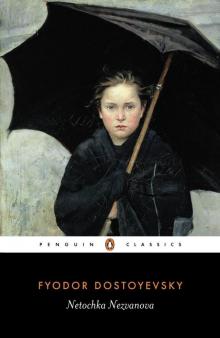 Netochka Nezvanova (Penguin ed.)
Netochka Nezvanova (Penguin ed.)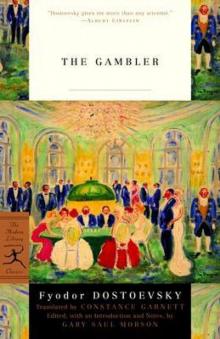 The Gambler
The Gambler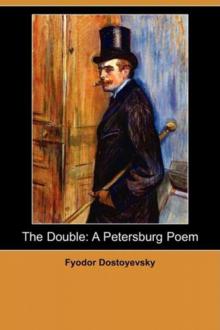 The Double
The Double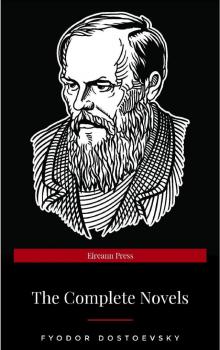 Poor Folk Anthology
Poor Folk Anthology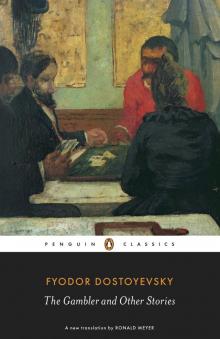 The Gambler and Other Stories (Penguin ed.)
The Gambler and Other Stories (Penguin ed.) Prestuplenie i nakazanie. English
Prestuplenie i nakazanie. English Notes from the Underground
Notes from the Underground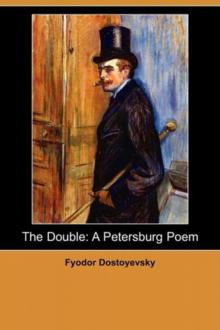 The Double: A Petersburg Poem
The Double: A Petersburg Poem White Nights and Other Stories / The Novels of Fyodor Dostoevsky, Volume X
White Nights and Other Stories / The Novels of Fyodor Dostoevsky, Volume X Complete Works of Fyodor Dostoyevsky
Complete Works of Fyodor Dostoyevsky Poor Folk and Other Stories
Poor Folk and Other Stories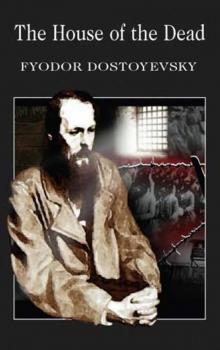 The House of the Dead
The House of the Dead